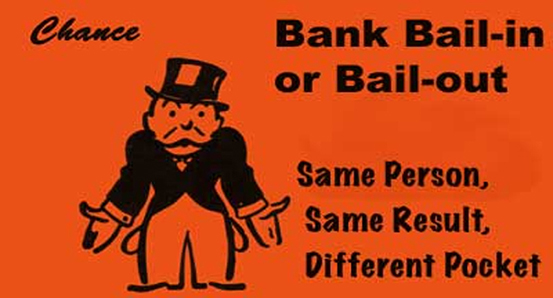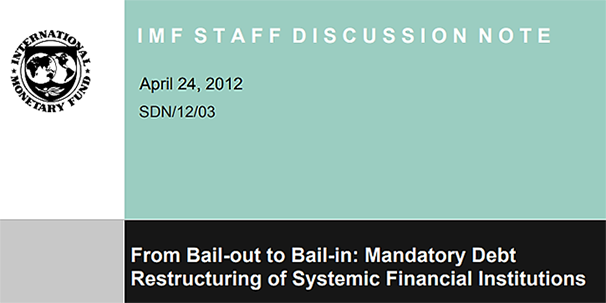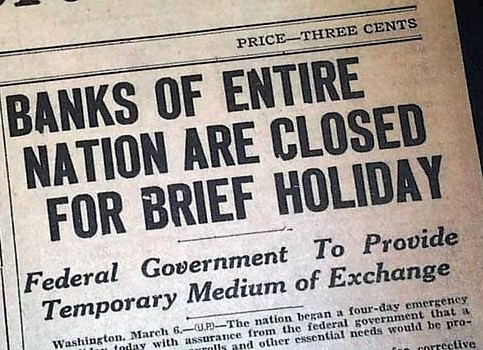
Legalized Bank Bail-Ins
Newly signed supranational bank laws amongst the world's largest 20 economic zones mean many bank accounts are not entirely safe from failure. Learn what current Bank Bail-In rules are and how to defend against them.
‘Legalized’ G20 Bank Bail-In Laws
Since the end of 2014, new G20 Bank Bail-In Laws have gotten put into place.
Bank depositors are now legally treated as unsecured creditors in the largest economies in the world.
G20 - (n) the world’s largest 19 national economies, including the USA, and the European Union together, a group of 20. Additionally, there are representatives of the International Monetary Fund (IMF) and the World Bank. The G20 finance ministers and central bank governors began meeting in 1999, at the suggestion of the G7 finance ministers in response to the financial crisis in the 1990s.
Bailin - (v/n) restructuring of a financial institution on the brink of failure, by forcing its creditors and unsecured depositors to take losses on their holdings. It often gets regarded as a rescue of last resort to help a troubled financial institution's ability to attract future business. A bail-in is different from a bail-out, which involves the rescue of a financial institution typically by government credit extensions into the failing private sector.

To possibly better address future bank failures, this G20 bank bail-in solution is now law.
It is a relatively newly signed supranational law and purportedly the brainchild of the IMF’s former managing director, Christine Lagarde. The same woman who is likely to become the head of the European Central Bank 2020s. Check out some of her staff's notes when she was in charge of the International Monetary Fund.

What this new law change means is the “LEGAL” status of US and other customer bank deposits within the G20 nations, placing them on par with many unsecured paper investments.
Now more than ever, if you give your fiat currency to a bank, it is your responsibility to know the solvency of the bank you chose. Including understanding any possible spillover effects, it may suffer under in another potential global financial crisis ahead.
Does your bank have any derivative bets on its books? You may want to find that out.
What about the FDIC?
For years bank insurance programs have lulled many main street savers to sleep soundly under the assumption that the government would always insurance covering their checking and savings accounts.
Well perhaps not so on a real basis, following another massive banking crisis.
As recently as November 8, 2017, the head of the European Union’s central bank (the ECB) has proposed to ultimately end bank deposit insurance for any bank accounts throughout the EU.
In the United States, the Federal Deposit Insurance Corporation (FDIC) currently offers a USD 250,000 limit in the USA per depositor, per FDIC-insured bank, per ownership category.
How solvent or robust is the FDIC’s bank deposit insurance program?
As of writing this in late 2017, the FDIC had some USD 83.2 billion to ensure just over USD 7.0 trillion in deposits. An additional USD 4.8 trillion in deposits appear to be uninsured and most likely above the USD 250,000 insurance threshold the FDIC currently covers.
For every fiat USD 100 note represented within the US banking system, the FDIC has just over 70¢ in its insurance coffers to payout. In terms of those deposits which fit under the FDIC $250,000 insured perimeters, the FDIC has $1.17 of insurance for every insured USD 100 in the US banking system.
The recent Omnibus bill legislation has repealed the Dodd-Frank Act's supposed ban on taxpayer bailouts of the most speculative derivatives activities. Thus taxpayer bailouts of potentially failing banks or financial institutions are still in play.
Most likely, the next global financial crisis will not only get met with some likely new forms of government and or central bank bailouts. While it may further be met with bank bail-ins too as many unsecured creditors, and even average Joe’s bank deposits, possibly get frozen and eventually get transferred to secured creditors. Ordinary people's unsecured savings in a bank account could be lost, and or diluted.
The Financial Stability Board (FSB) is sanctioned by and literary works out of the Bank for International Settlements (BIS) building. This rather innocuous-sounding organization currently guides the G20 nations’ bankruptcy resolution policies.
They wrote the following excerpt in their November 10, 2014, Total Loss Absorbency Capacity proposal on how all G20 banks should now have bank deposit bail-in options in the event of bankruptcies or massive loss write-downs.
The FSB states the following on page 5, 2nd paragraph:
With these new supranational laws, executed by the G20 (on behalf of the BIS’ FSB), any winning megabank derivative gamblers are now 1st inline creditors.
Joe Public is an unsecured creditor, who would be lucky to get some diluted equity shares in a ring-fenced reformed bank as compensation for his lost checking and or savings account funds.
If you have a bank account with a ‘mark to model’ potentially bankrupt bank, or maybe with whom the BIS’ FSB calls Global Systemically Important Banks (see G-SIBs on page 3). Time is running out for you to reconsider with whom you are doing business.
A similar bank bail-in policy got already put into action in 2013 (Cyprus) and 2016 (Austria, see 'test case' wording).
We should all be preparing a defense of our savings, in case this trend ever goes global.
If you live and or bank in a G20 nation. Prudent to expect history may rhyme at some time.
Digital lockdown laws and living bank wills are getting readied and even demanded by central bank heads.
In case, any large banking or financial institution fails again. All this effort is getting put forth. Mainly because the real underlying issues of leverage and record level debts not written down have not been restructured nor fully faced.
We’ve not structurally changed much since the last financial crisis; the situation is arguably worse.
The brutal truth of new global bank bail-in laws now in place goes well beyond its outcome. The fiat currencies in our bank accounts have and will always be our liability. It is a real shame we all may have to relearn this lesson in a potentially harsh way.







